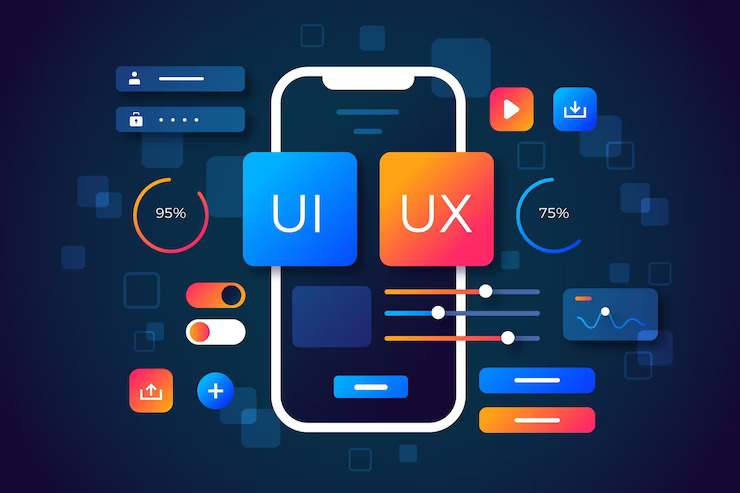BLOG
How Generative AI is Revolutionizing Application Development?
How Generative AI is Revolutionizing Application Development?
Artificial intelligence continually expands its reach, with notable advancements seen in generative AI in recent years. Generative AI essentially represents intelligent tools that learn and create new content across various mediums like text, images, code, and audio. These tools draw insights from extensive examples and experiences.
Across sectors like mobile and web development, generative AI has gained significant traction. Developers now harness its potential to craft applications that enrich user experiences and personalization and streamline workflow efficiency.
The rise of prominent generative AI tools signals a future where AI-powered solutions are used everywhere. These tools excel at generating fresh ideas, content, and solutions rapidly, enhancing decision-making and operational simplicity. They empower businesses to thrive in dynamic markets by fostering innovation in products and services. Generative AI’s potential is widely recognized, making a substantial impact on the business landscape.
This transformative technology holds promise for revolutionizing mobile app development, simulating human creativity to produce remarkable and diverse outcomes. It stands as a pivotal field ripe for exploration and advancement.
In this blog, we delve into the realm of generative AI, exploring its influence on app development and uncovering the fresh opportunities it presents.
Understanding Generative AI
Generative AI operates with advanced algorithms, primarily relying on extensively trained machine learning models working with vast datasets. These models possess the capability to discern and understand patterns and structures, thereby enabling them to generate innovative and easily understandable outputs.
The term Gen AI includes any artificial intelligence (AI) system or application with the ability to generate fresh content. Nowadays, Generative AI finds applications across diverse fields, such as image synthesis, where it can produce realistic images of non-existent objects or scenes, as well as in content creation, artistic endeavors, and beyond. It has transcended its previous role as a mere tool, evolving into a creative force that brings vitality to various forms of content.
Generative AI’s Impact on Application Development
-
Project Management and Problem-solving
Generative AI in the project realm functions as an extraordinary project manager, analyzing extensive data sets to unveil optimal plans, suggesting ideal task assignments, and even conjuring innovative features on the fly. This innovative technology reveals hidden patterns and offers strategic insights, acting as a valuable consultant. Whether optimizing resource allocation for maximum efficiency or assigning tasks based on team members’ strengths, generative AI becomes a hidden helping hand.
-
Code Generation and Automation
Generative AI serves as an expert companion, providing insights and crafting clean code snippets based on past projects. It enhances coding speed, eliminates errors, and aligns code with standards. Beyond being a code-writing companion, it refines algorithms, suggesting smarter practices that elevate developers from coders to coding experts. Generative AI empowers developers, aiming not to replace them but to enhance their capabilities.
-
Improved UI Design
It’s time to Bid farewell to clunky interfaces and hello to AI-powered design tools that elevate UI and UX experiences. Generative AI analyzes user data to suggest optimal layouts and upgrades for a seamless experience. It acts as a real-time focus assistant, consistently providing feedback to make apps intuitive, user-friendly, and effective.
-
Creativity and Personalization
Generative AI tailors mobile experiences to individual user preferences, offering brilliant ideas that inspire developers to create adaptive experiences. From personalized music recommendations to mind-blowing games, AI is transforming industries and promising a future where apps surpass expectations.
-
Experimentation and Testing
Generative AI plays a pivotal role in experimentation and testing, rapidly creating different app versions for A/B testing and developing test cases to identify bugs early. AI-powered tools bring ideas to life instantly, resulting in faster iterations, sharper concepts, and apps that excel from day one.
Real-world scenarios of Generative AI:
- Artificial intelligence holds tremendous potential for expansion into new markets and application areas, catering to both small-scale personal initiatives and complex business solutions. Industries such as infographics, image editing, sound editing, translation, composition, and dubbing, as well as automotive, media/entertainment, healthcare, and scientific research actively leverage generative AI.
- Rather than replacing developers, generative AI is poised to become an essential tool in their toolkit, freeing them to focus on more intricate and creative aspects of app development. The significance of ongoing education and lifelong learning cannot be overstated in helping individuals adapt to the evolving landscape of AI. Success in the field relies on the ability to stay current and proficient in advancing AI technologies.
- Amid the transformative impact of AI, questions arise about the changing role of human developers in an AI-dominated environment. While AI has the potential to enhance output and innovation, it prompts considerations about the future of human developers.
- To effectively harness AI, future developers must acquire new abilities and expertise, including a deep understanding of AI’s potential and limitations and how to seamlessly integrate it into the development process. Adopting generative AI for the future of application development requires a strategic and thoughtful approach, considering the journey ahead.
- Generative AI, while not magical and accompanied by its drawbacks, exhibits overwhelmingly positive outcomes. This innovative technology is already demonstrating brilliance, assisting businesses and individuals in unleashing their creative potential. Tools like ChatGPT and Bard showcase the transformative capabilities of generative AI, generating text or images based on diverse and imaginative ideas. It’s like to having a personal genie in a bottle, ready to fulfill creative wishes. While there is room for improvement, the future appears promising for generative AI.
Generative AI in Various Sectors: Healthcare and Real Estate
In the healthcare sector, a significant hurdle revolves around patient data confidentiality. The intricacies of sharing such data for research and development are challenging due to privacy concerns. Generative AI, however, addresses this challenge adeptly.
By generating synthetic patient data, Generative AI creates AI-generated counterparts that mimic real patients’ characteristics without including any identifiable information. This innovative approach allows researchers and healthcare professionals to train their machine learning models on these “fake” patients, fostering the development of more precise models and ultimately leading to improved treatments and enhanced patient outcomes.
Real estate enterprises embracing generative AI have witnessed a remarkable surge in their net operating income, exceeding 10%. This success stems from a powerful fusion of AI-driven strategies, resulting in streamlined operations that save both time and money. Additionally, the implementation of generative AI contributes to increased customer satisfaction, prolonged customer retention, unexpected revenue streams, and more informed asset choices that bolster profitability.
Conclusion-
Generative AI is revolutionizing the landscape, bringing a fresh wave of digital transformation. It’s reshaping the way we design and engage with technology. Fueled by cutting-edge AI models, this creative powerhouse is streamlining processes, fostering collaboration, and even prompting ethical reconsiderations.
Developers and organizations that embrace generative AI will unlock next-level software solutions, and stay ahead of the curve. It’s a playground of creativity with profound implications, offering a glimpse into the future of digital interaction.
Related Topics
Trending Topics
Want to build Super app for your business?



